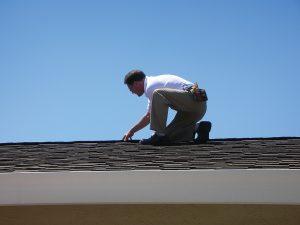 After major storms or with older homes, you may want to hire professional roofers or roofing inspectors to evaluate your roof. For homeowners doing their own evaluation, here are some tips:
After major storms or with older homes, you may want to hire professional roofers or roofing inspectors to evaluate your roof. For homeowners doing their own evaluation, here are some tips:
Tip 1 – Make sure to inspect your roof on a windy day. That’s when you’re most likely to see broken tiles or those not secured properly because they’ll be “flapping” in the wind.
Tip 2 – Take a pair of binoculars and “inspect” your roof from all angles around your house. Look for missing or damaged tiles that may indicate the life of your roof is coming to an end.
Tip 3 – If you have asphalt shingles, when you clean out your gutters, look to see how many asphalt granules are in the gutter. An abundance of shingle granule residue means your roofing product is starting to break down and fail, which may mean a new roof is in your future.
Tip 4 – To view and fix problem areas yourself, use caution on the roof and with ladders. Always work with at least one other person and take special care with tools brought onto the roof to secure them.
Tip 5 – When severe weather or a hail storm comes through your area, note the date and time immediately. If you think your roof has been damaged, contact your insurance agent first. There’s no need to contact a roofer. Your insurance company will send their own inspector to evaluate any damage that may have occurred.
When choosing a new, strong roof designed to protect your home and its occupants, here are some things to consider:
Fire Prevention
Real wood shake roofs can be extremely combustible and serve as kindling for wildfires. Consider investing in a roof that resists flame spread. While no roof will resist a “ground up” fire that engulfs the entire home, polymer roofing tiles that are installed with proper underlayments, can help protect a home from wind-driven embers that can ignite the roof.
Impact Resistance
Damage from airborne tree branches and flying loose items can be devastating to a roof not equipped for impact. Having a synthetic roof that has achieved the highest ratings on impact resistance tests can help protect your property.
Durability
Ideally, roof tiles should resist curling, fading, cracking, mold, algae, fungus and insects. Roofing products that come with a strong warranty can also offer you peace of mind.
Other Considerations
Protecting your home and family should be your number one consideration. Luckily, durable synthetic roofing options abound that offer the authentic look of real wood or slate beauty, as well as environmental sustainability.
For an important, lasting home project, evaluate your roof and consider making an upgrade that will protect your house from everyday wear and tear, as well as the worst case scenario. ![]()




